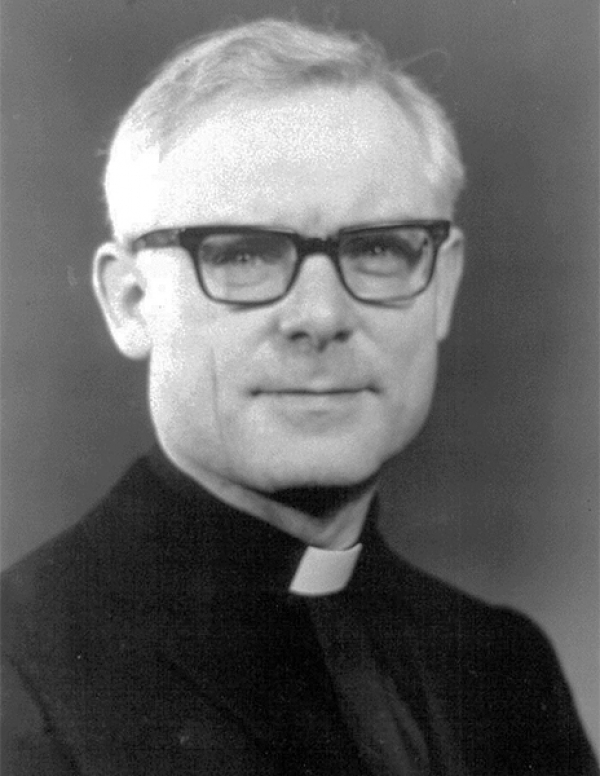Father Harrie Verhoeven SSS
26.12.1929 – 30.12.2020
Curriculum Vitae
26.12.1929 Birth and baptism at Overloon, Holland, diocese of Bois-le-Duc
14.09.1949 Novitiate, Baarlo
14.09.1951 First profession, Baarlo
1951-1953 Philosophical studies, Nijmegen
11.10.1954 Perpetual Profession, Rome
1953-1958 Theological Studies, Rome, Pont. Univ. Gregoriana
26.05.1956 Deaconate, Rome
26.07.1956 Priesthood Ordination, Rome
1959-1963 Professor of theology, Nijmegen
1963-1968 Master of novices and superior, Baarlo
1965-1969 Provincial consultor, Province Saint Joseph
1968-1969 Master of novices and superior, Nijmegen
1969-1981 Superior general
1987-1990 Provincial consultor, Province Saint Joseph
1993-1999 Provincial vicar, Province Saint Joseph
1996-1998 General Secretary of the Episcopal Conference of the Netherlands
1999-2005 Provincial superior, Province Saint Joseph
2001-2004 Episcopal Delegate for KRO (Catholic Radio/Television)
2002-2004 Member of Board of Directors of Communicantes and Bovendonk Seminary
2005-2020 Member of Nijmegen community
Letter of condolence from the Superior General
Rome, 30th December 2020
Dear Father Maurits Gijsbrechts sss
Provincial Superior
Province of Saint Peter-Julian Eymard
On behalf of the whole Congregation of the Blessed Sacrament and of the General Council, I offer you our most fraternal condolences for Father Harrie Verhoeven’s Passover that took place on 30 December 2020.
We are deeply grateful to God for his valuable gift made to our Eymardian Family in Father Harrie, who carried out valiantly and with abnegation the difficult service of Superior General of the Congregation during two mandates, from 1969 to1981. We recall that under his coordination our Congregation followed the path of updating required by the Church in the aftermath of the Second Vatican Council. One of the great fruits of this period was the work of revising our Rule of Life.
Our praise to God for the gift of Father Harrie's life is likewise for the countless services he made to the Universal Church, to the Church of the Netherlands and to your Province. Steadfastly and ever aware of the mission to which he was called by the Lord, he led a fruitful life that has contributed to opening so many institutional developments.
We ask God the Father insistently to welcome him into his Kingdom. May he be now, with our brothers who have gone before us on this vocational journey, another intercessor whose prayer will assist us to fulfil our mission.
While sharing the pain and hope created by this loss of physical contact with our brother, Father Harrie, we renew our solidarity with you, reassuring you of our fraternal support. United in prayer.
Fr Eugênio Barbosa Martins, sss
Superior General
Witnesses
In memory of Father Harrie Verhoeven
The day after Christmas 1929, on a farm in Overloon in the Netherlands, Harrie Verhoeven was born, the 5th child to a family of 10 children. In 1944, during World War II, Harrie was seriously injured. For him this was a painful memory throughout his life. Following his studies in Nijmegen and Rome, he was ordained a priest in Brakkenstein.
During the ’60s, Harrie was mainly responsible for the education and formation of our young religious. He ensured a new spirit would breathe, as borne out by the testimonies of some confreres, whose Master of novices he was. The internationality of the novitiate (already!) was exceptional: besides the Dutch and Belgian novices, there were also Vietnamese, Swiss and Germans. Harrie's talent for languages was remarkably beneficial there.
After being elected Superior General (on 21 October 1969), a new phase in his life began. Being a "peritus" of the Dutch bishops already, he actively took part in the Second Vatican Council. One of the tasks the Council entrusted was that of the renewal and adaptation of religious life, in particular regarding the Rules of life. In the first part of the commentary on our Rule of Life, Father McSweeney describes the difficult process involved in its redaction.
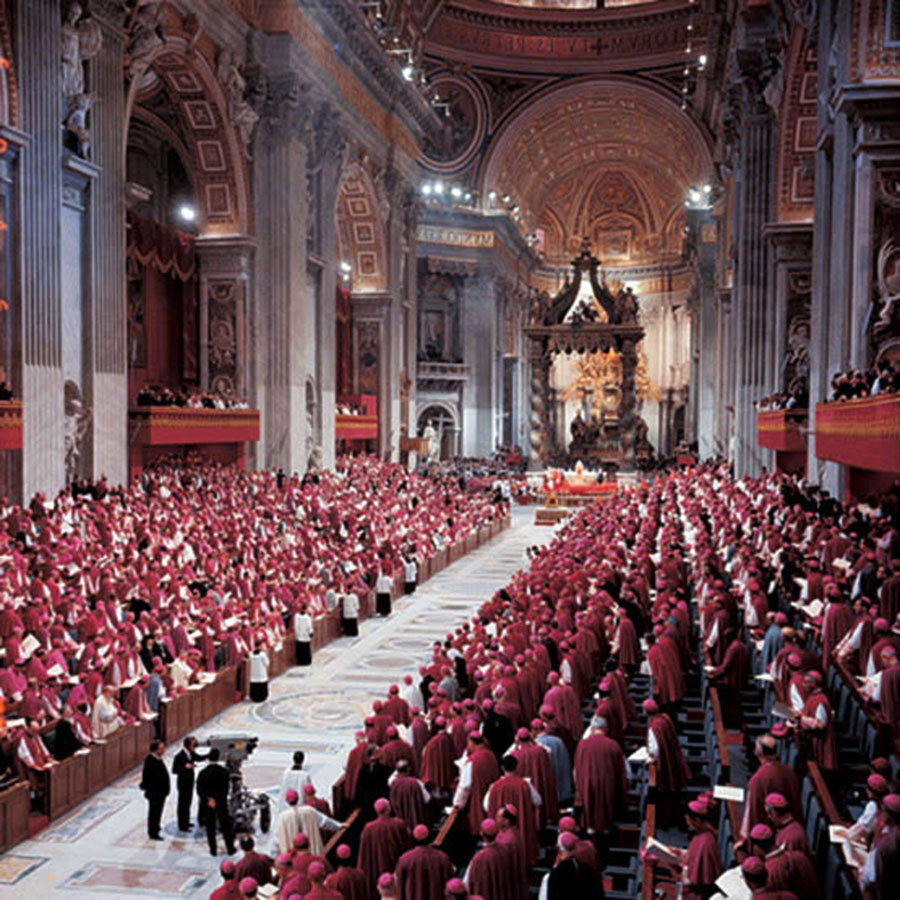
As Superior General, Harrie visited the commu-nities of the Congregation several times. He supported the communities in India and Vietnam, the latter having been isolated for years from the Congregation by the Communist regime. In 1981, Father McSweeney succeeded him as Superior General. For his many services, Harrie was awarded the distinction "Knight of the Order of the Dutch Lion".
After his Roman period, because of his qualities of government, his numerous contacts abroad, his talent for languages, he was invited often to give talks, retreats, courses, etc ... The functions and tasks that he fulfilled are too numerous to mention all of them: diocesan person responsible for catechesis in Rotterdam, secretary general of the ecclesial Province of the Netherlands, national director of pontifical works, parish priest in Rotterdam, Gouda, Delft, Nijmegen… and yes, also Provincial Superior (1999-2005). During Pope John Paul II's visit to the Netherlands, he acted as his interpreter. Clearly, Harrie was a "monument", and not only in our Province and the Congregation, but also for the whole Church of the Netherlands.
In September 2020 he was admitted to the Aqua viva ’rest home - our near neighbour in Nijmegen - until becoming assailed by the Covid19 pandemic, from which he died there on the morning of December 30th.
On behalf of the Bishops' Conference of the Netherlands, Bishop van den Hende wrote: “With gratitude we look back on him, above all for his commitment towards the Ecclesiastical Province of the Country… As a person he was enjoyable company, ever ready to dialogue, having a realistic approach to the Church and her mission for our society. … His personal and lived faith in the Lord has reached its completion.”
And Bishop Hendriks of Harlem-Amsterdam adds: "His qualities as a religious, theologian, administrator, but above all his pastoral depth as a believing priest are innumerable".
And her sister Joke concludes her farewell as follows: “Dear Harrie, you had a strong trust in God, and you believed in paradise. We hope you are there, where it would be lovely for you to be reunited to Dad, Mum, and all of our deceased family and friends.”
Father Maurits Gijsbrechts, sss
Provincial Superior
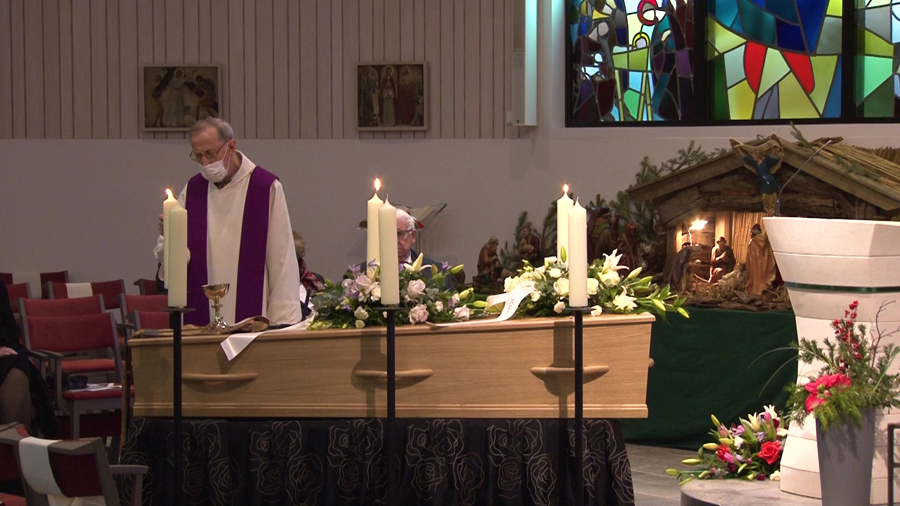
In Memoriam Father Harrie Verhoeven by Bishop Jan van Burgsteden, sss
Funeral Eucharist, Nijmegen, Holland
5 January 2021
Dear Harrie,
Before 1960 I had heard about you mainly through your fellow citizen and my contemporary, Father Theo Ewals. In 1960 you arrived with a doctorate in theology, magna cum laude, to our scholasticate in Brakken-stein, Nijmegen, to be a professor. You taught us fun-damental theology.
One evening you spoke of an ecclesiastic movement, that of the Focolari, the official name of which is the Work of Mary, that you had got to know in Rome. The Holy Spirit has enriched our Church more than ever with new charisms to adapt the Church for the new era to come. What you said touched me and I felt interiorly the desire to know more about it. A period of turbulence that broke out in Holand didn’t spare our religious life. Priests and brothers left. I was likewise faced by the question that I spoke about: ‘What must I choose?’ The person with whom I discussed this problem listened attentively and didn’t say much. He let me speak. It is thanks to you, Harrie, that I am here.
Harrie, you became the master of novices. You invited me each year to go on holidays with the novices. I saw how you carried out and lived your delicate task: with a personal love for each one, according to the Holy Spirit, more as a mother than a teacher. Your manner of fulfilling this delicate task later became a model for me as master of novices.
You were sent with Father Jan Nelis and Father Gerrit van Duinhoven to the General Chapter in 1969. Father van Duinhoven assured you beforehand: “We’ll bring you back to the Netherlands.” Things turned out differently, for you didn’t return. You were elected Superior General for twelve years, from 1969 to 1981. Upon your shoulders fell the mission of the Second Vatican Council (1962-1965), that of revising our Constitutions.
During the General Chapter of 1981 the new Rule of life was adopted unanimously and submitted for the approbation of the Holy See. The unity of the Congregation has been kept safe in this process. Only a small group in Brazil followed its own path. But you maintained contact with them. And they returned to unity. You opened the way and visited our confreres in Vietnam, who for years were isolated because of the communist regime from all contact with the Congre-gation. It was the same regarding our brothers at Brno, in Czechoslovakia, who were also cut off by the same regime for years.
As Superior General you wrote to the Congregation a long letter rich in content about adoration. You brought about for your confreres a publication on the Gift of self of our Founder’s great retreat at Rome in 1865. The two editions reflect your own experience. At the same time, like Father Eymard, you maintained a correspondence worldwide and assisted many persons by your advice and actions.
You came back to the Netherlands in 1981. From 1987 to 1999 you were the Provincial Vicar. In this period you were a wise and experienced counselor. You enabled me to learn much, everything that prepared me, unaware of it, for an entirely unexpected task in 2000.
We were in Rome together for the International Eucharistic Congress in 2000. Pope John Paul II wanted to celebrate the beginning of the new century as one of the Eucharist rather than the jubilee of the year 2000. For this, on 6 January 2001, the feast of the Epiphany, he issued his Apostolic Letter Novo Millennio Ineunte (144 years after the first solemn exposition of the Blessed Sacrament in the chapel of the Congregation in Paris).
This was followed two years later by the Encyclical Letter Ecclesia de Eucharistia and, in the year of the Eucharist 2004-2005, by his Apostolic Letter Mane nobiscum Domine. Through the publication of these documents the Pope wanted to situate the Eucharist and adoration at the heart of the Church in this new century. He shared with the Church his own expe-rience of what the Eucharist and eucharistic adoration signified in his life.
In the course of our meetings, Harrie, we have spoken of our experiences of celebration and ado-ration, of what the word of God has done in us, of the manner in which we have experienced sadness, suffering, disappointment and joy. And what was striking is that in our meetings there had never been any sign of your illness.
Dear Harrie,
This means that in the week of Christ’s Nativity you are celebrating your rebirth into heaven and that on the eve of the feast of the Epiphany you continue to adore the Lamb in heaven.
Our meetings continue. You haven’t departed, you are nearer than ever.
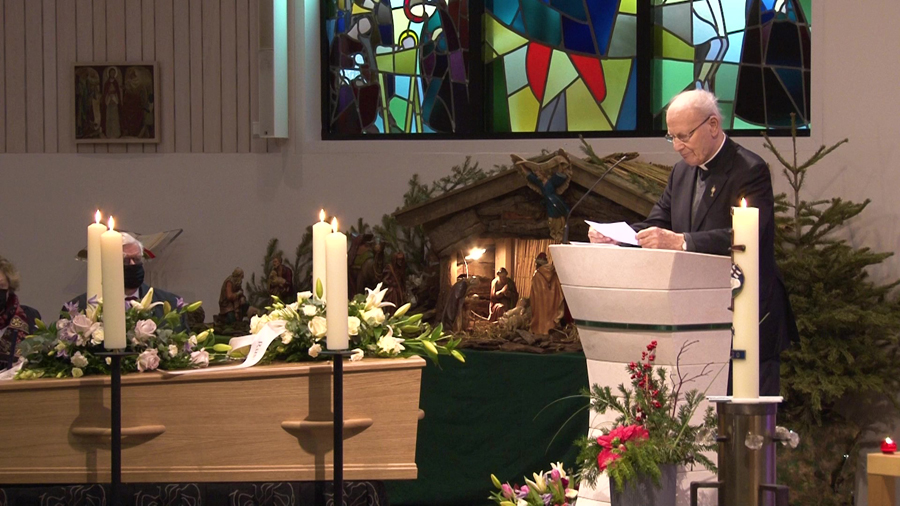
Father Harrie Verhoeven and the renewal of the Congregation
Among memories that I have of dear Father Harrie Verhoeven, who has left us, the most important one is that of the decisive part he assumed in the renewal of our Congregation, particularly during the two sessions of the special General Chapter held in 1969 and 1971. To explore this event we have the Acts of the Chapter (2 volumes), as well as the Commentary of the Rule of life by Father Anthony McSweeney, who develops here the stages of its elaboration (about 70 pages in the Italian edition).
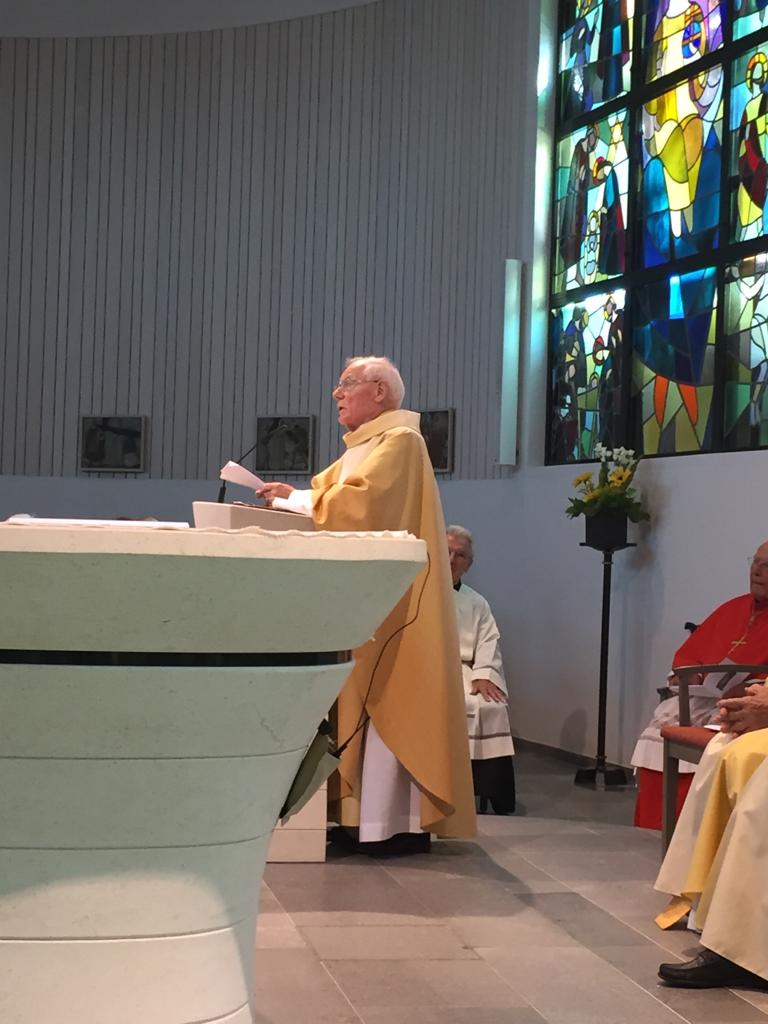
The 1st session took place in Rome at the premises of the parish of the holy Canadian Martyrs, from 9 September to 25 October 1969; it comprised 57 members. Among these Father Harrie was the 3rd delegate of the Dutch Province. But he soon became one of the four members of the Presiding Council. The clarity of his thought, his spirit of synthesis, his capacity to understand and speak languages, his experience as a formator of young religious, his knowledge of the Founder’s thought and his attachment to the Institute were all assets in regard to leading a large assembly, disparate in its opinions, and for opening new approaches when discussion risked becoming stuck in sterile opposition.
A lot of tact was required for the Presiding Council to raise the debate above divergences to its true level: this concerned how to transmit the heritage of our Founder as Father Eymard lived it in the 19th century, and to translate it into new terms in the context of the Church and society of the 20th century? The four documents that were elaborated in the course of the 1st session and approved by a very large majority reveal the fundamental unity of the Congregation at this historic time.
On 21 October the Chapter was drawing towards its end. It was necessary to proceed toward the elections to implement it. Father Harrie wasn’t on the list of those ‘eligible’ for the task of superior general, since he lacked two months from the canonical age of 40. The idea of a postulation was then circulated and submitted to him. It was put to the Presiding Council that accepted it: if he received 2/3 of the votes an indult of dispensation of age would be requested from the Congregation of Religious. And this is what happened: the outcome of the ballot was one more than 2/3 of the votes cast… This was an extraordinary moment that exploded in joy on Harrie’s acceptance of being cho-sen. It wasn’t the victory of one or other camp, but the overall trust placed in a man chosen to take up the task to accompany the renewal of the Congregation. He wouldn’t be alone, but endowed with a Council that would effectively support him as a team in the mission entrusted to him. Anyone who lived these days regards the memory of them as a ‘Kairos’, a graced occasion.
This 1st session was only the beginning of a work of deepening, assimilation of the main directives of the four basic documents in the Congregation at all levels. This was then, respecting due proportion, like the Church in the aftermath of the Second Vatican Council, a matter of transmitting the texts into living. In an important part of the Institute the traditional vision held sway. It wasn’t only out of reluctance, but also concerted actions to remain in the past in reaction to as if the Chapter had sold off cheaply the aspect of solemn worship or adoration… Father Harrie, with his Council, undertook, by means of visits, documents, rereading the Founder’s charism, a mighty task of accompanying Provinces and communities in their journey toward a deepening of the theology of the Eucharist, etc… - all this being in the perspective of holding a 2nd session of the Chapter in 1971. Two years were a short time, but this was enough for the majority of religious, rather traditionalists, to acquire a renewed vision of our mission.
The special General Chapter’s 2nd session took place at Frascati, in the villa Campitelli, from 1-22 August 1971. Situated in the Colli romani about twenty kms south of Rome, the villa lacked air conditioning and the summer heat was fierce. This Chapter had the greatest number of participants in our history, comprising 69 members, among whom, to ensure greater representation, scholastics and lay brothers had been invited.
Father Harrie with his Council had worked hard to prepare this important meeting and planned its procedure. His opening discourse outlined the state of the Congregation, the path that had been realized, alas also the manoeuvres of some religious to denounce the work of the 1st session at the Roman dicasteries, above all the urgency to bring to completion the work in hand to respond better to the challenges facing the Church and the world.
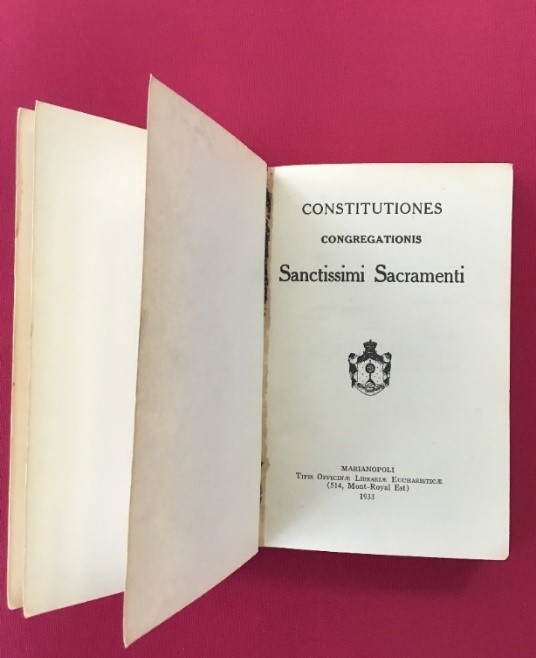
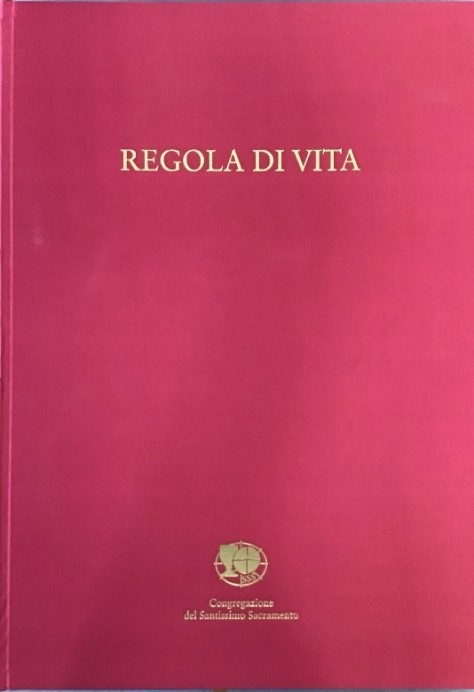 Best procedures can have contrary results. This happened when discussion was directed to the first numbers of the text drawn up by the General Council: under a pretext of freedom of expression, sub-amendments took over from the relay of amendments. In ten days hardly five numbers had been voted on. On 10 August Father Germain Comment’s vigorous intervention brought about the awareness to change the procedure to reach the aim in the limited time remaining. After deliberating this, the Presiding Council decided to focus the energy of the Chapter by concentrating on what was commonly agreed. Starting from the linguistic groups, it was requested to redact simple options that characterised the charism and mission of our Congregation today. Quickly guidelines were drawn up and disputed issues were discussed and formulated in a manner to be adopted.
Best procedures can have contrary results. This happened when discussion was directed to the first numbers of the text drawn up by the General Council: under a pretext of freedom of expression, sub-amendments took over from the relay of amendments. In ten days hardly five numbers had been voted on. On 10 August Father Germain Comment’s vigorous intervention brought about the awareness to change the procedure to reach the aim in the limited time remaining. After deliberating this, the Presiding Council decided to focus the energy of the Chapter by concentrating on what was commonly agreed. Starting from the linguistic groups, it was requested to redact simple options that characterised the charism and mission of our Congregation today. Quickly guidelines were drawn up and disputed issues were discussed and formulated in a manner to be adopted.
Based on these 43 ‘options’ a new text was drawn up and adopted by a very large majority: this was the ‘Rule of life’. It was a text for experimental use in the Congregation and to be approved as such by the General Chapter of 1975. Father Harrie was re-elected and carried on his role. Consequently, this text became the basic document in view of its definitive approval at the General Chapter of 1981. The Rule of life, after some amendments, was then adopted almost unani-mously, together with the General Statutes.
Father Harrie’s mandate reached its goal: he had carried out with faith and tenacity the difficult task of accompanying and leading to its conclusion the elaboration of the basic documents for the renewal of the Congregation. For this we regard him with im-mense gratitude.
Paris, 15 January 2021
Father André Guitton, sss
Harrie Verhoeven S.S.S.
Father Harrie Verhoeven lived his Passover on the threshold of the fiftieth anniversary of the drawing up of the Rule of life, which animates this family of believers who follow Saint Peter-Julian Eymard around the “Blessed Sacrament”. He has been also its first inspirer, then its promoter and furthermore teacher travelling all the continents to make known its riches and above its fidelity to the founding charism. He made it understood that Peter-Julian was always en route and his faith in the Eucharist went beyond “solemn exposition of the Blessed Sacrament”; making the interior cenacle understood, the gift of self grasped as utterly fundamental in the sacrament: “This is my Body. This is my Blood. This is my Life”.
Peter-Julian Eymard didn’t succeed in bringing out this spirituality in the Constitutions written at Saint-Bonnet in 1863. It would require the biblical, liturgical and theological renewal that took place from 1900 to the Second Vatican Council to bring out the full scope of the Eucharist that included the service of the poor, workers and prisoners, which Peter-Julian himself always associated with this Sacrament at times in Lyons and Toulon, then in the suburbs of Paris.
This conversion of the Congregation to these perspectives of a global Eucharist, rather than being reduced to the monstrance, was not easy and Father Harrie had to live some Passovers in carrying out his ministry as superior general.
He was also an ardent promoter of the “Eymardian Places” and of the rediscovery of the “Writings of the Founder”. I keep a letter of his, written after the testimony I gave about the experience of following “in the footsteps of the Founder” that was lived with young Colombian confreres in 2013. In this letter he expressed his faith in this way of returning to the sources.
We owe him a great deal.
He was a source of life.
Bogota, 4 January 2021
Father Camille Gagnon, sss
Superior Province of San Juan XXIII
Dear Harrie,
Something isn’t right. You were someone who at festivities, meetings and funerals would get up to speak. This is, alas, no longer possible. We shall have to continue without you. You had it quite hard in the last months. There was a war in your head. Incapacity, frustration and anger. You didn’t make caring for you easy, and this was likewise hard for you. The end was a deliverance.
You were a Christmas kid (26-12-1929). Born 91 years ago in Overloon Brabant, you were the 5th child, followed by five others. A balance was thus brought about: five boys and five girls in a warm family. All were welcome to eat, remain, lodge, everything made possible when many of your fellow students and confreres used to come to our home.
Quite young you took the decision to become a priest. Dad used to say: “My boy, what’s got into you?” and he tried to make you change your mind. Just the opposite happened when finally each one became proud to have a priest in the family. You had no doubt and stuck to your decision. When you were ordained you made Dad proud. Your priestly ordination was impressive. I was still young, but it is engraved into my head. It was a festivity lasting the whole day in which the whole village took part.
You lived in many places, everywhere making connections and friendships. At Rotterdam and Gouda these were with Ben, Margreet, Bert and Father van Schayk. When you were in Baarlo you established a friendship with the mayor Franz Schols, that lasted until his death. You also had links with Cardinal Simonis, who even came to our Mum’s funeral, which was a great honour for us. It’s difficult for me to name others, because I didn’t know all. You already left home when I was born. Later you lived for a long time in Italy, first of all for studies and then for twelve years as the Superior General of the Congregation.
You travelled around the world. Your knowledge of language was a great advantage for you. The basis of this was already begun when you were four years old. You were suffering from knee trouble and so had to spend time in a sanatorium at Wijk-sur-Mer. The local doctor said: “I speak various languages, but I don’t understand this little chap.” Harrie was only speaking the official patois of Overloon. When he returned eight months later, we would tease him because he only spoke Dutch. It is not often to find people unable to understand you: you spoke many languages. You wrote your thesis in French and later even translated it into Italian. There was a time when you tried to learn Russian. During the pope’s visit to the Netherlands, you acted as his interpreter.
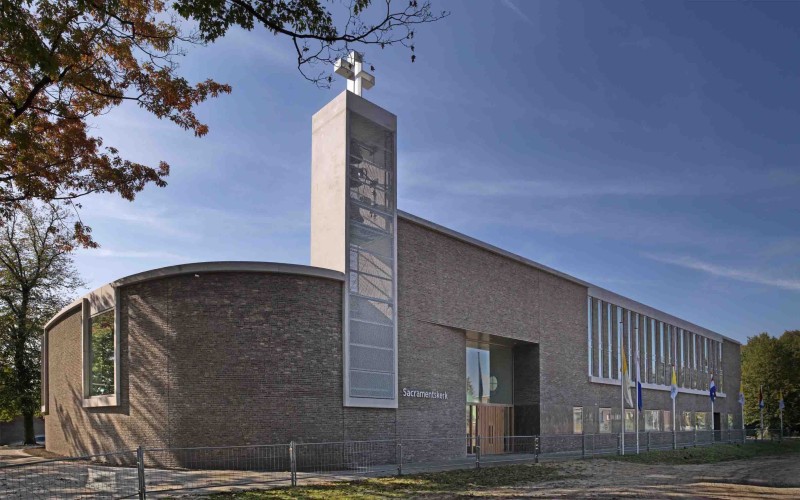
But life has been rich, you said some weeks ago. Then you felt useless and I tried to convince you of the contrary. You had made enough of it and you could rest. A pity that we are unable to tell you of how many expressions of praise we have listened to. A few months ago, you had indeed to leave the community of Brakkenstein to go to the rest home of Aqua Viva. You were cared for there in difficult circumstances, for which we are grateful.
We wish likewise to thank Harrie’s confreres, who came to share together a coffee or a little glass of something, while chatting. This was enjoyable for him. A particular thanks to the Father Superior, Fons Kuster, who was ‘booming’ in responding, and to Father Henk Kuis for his daily visits. This did a lot of good for Harrie, and also for us – a familiar face in a strange environment. It is a miracle, Henk, that you didn’t contract the Corona virus. You have an angel beside you. We are grateful likewise to Kees, who was his support unto the last breath, when he realized Harrie had come to the end.
We are also grateful to all the persons present and those who wanted to be there but who, because of circumstances, had to stay away. Support Harrie’s sisters, who need it very much.
Dear Harrie,
You had a strong trust in God, and you believed in paradise. We hope you are there, where it would be lovely for you to be reunited to Dad, Mum, and all of our deceased family and friends.
Farewell, Harrie.
Mrs Joke, sister of Harrie
Memories of Father Harrie Verhoeven sss
at time of Novitiate
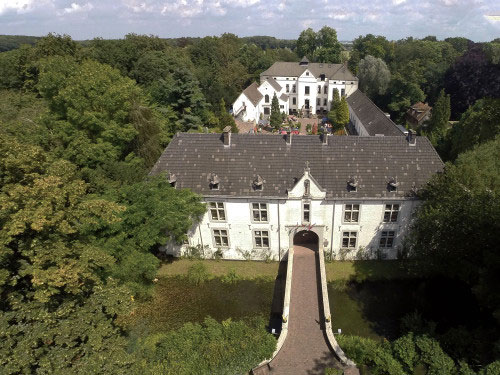
I began the novitiate on 29 September 1964 at Bassenge, after a month of postulancy. We were four Belgians: three Francophones and one Flemish spea-ker - Jean-Marie, Etienne, Frans and me. We were en route for two years. The novitiate, at the top of the hill of Bassenge, was in the old style, which, to give you an idea, meant for instance: wearing a cassock all day, also when picking fruit or weeding the paths of the garden, and requiring permission to write a letter to our parents… Clearly, we were very glad when Father Raymond Barbé, socius of the Novice Master, accom-panied us on a walk on Wednesday afternoons, since his pockets bulged with packets of cigarettes! It was great!
A surprise came in the course of the month of July or August 1964: we were going to spend the second year of the novitiate abroad in the Netherlands, in the De Berckt district, at Baarlo. Etienne and Frans were no longer there, but only Jean-Marie and I would be going. And there was the welcome news that a tailor would be making clerical suits for us to wear in the town, since in that country it was forbidden to wear a cassock in public. Another surprise yet: De Berckt was in a flat country, stretching almost along the Meuse. We were used to climb and descend the hill of Bassenge. It was astonishing on opening the drawer in my room to find a packet of envelops on a sheaf of paper! This was unbelievable! I was really in a foreign land!
The Master of Novices, Father Harrie Verhoeven, showed us around the house – fully carpeted novices’ recreation room – strange indeed. But most amazing was the Father’s lesson: Holy Scripture, the Writings of Father Eymard, the History of the Congregation, in French or in Dutch. Dutch all day with confreres enabled me to become at ease with the language of the poet Vondel. Great!
Recreation was enjoyable, multiple topics of con-versation, visits of guest ‘speakers’ for us, acquain-tances or friends of Father Master. Rich in contacts, interest in external realities and the faces of the Congregation from the world. St Exupéry wrote: ‘To me nothing human has been foreign’. Father Master Harrie made us truly live this sentence. Harrie was for us so understanding, encouraging, helpful, supportive, a role model.
I thus came to the end of the novitiate. On 14 September 1965 I made my first vows. And on that day in the recreation room, the novices and young profess-sed with Harrie all celebrated on the farewell evening. On the very next day we returned, Jean-Marie and I, to Belgium, in preparation to depart to Marly and the university of Fribourg.
Thank you, Harrie, for all that you have been for me: an example of openness of spirit, tolerance, forgi-veness and can I put it thus, friendship. We have always very much enjoyed meeting in the course of the following years, you as Superior General and then in our house of Brakkenstein, when we recalled episodes of life at De Berckt.
Yes, thanks again, Harrie, a thousand times! The Good God will be good towards you!
Father Gérard Daix, sss
I knew Father Harrie Verhoeven as Master of novices from when I arrived at Baarlo in 1965. He was a warm and open 36-year-old religious, the Superior and Master of novices of a large community of 35 religious, comprising Priests and Brothers.
On the one hand, there was a good international group of novices and, on the other, a community of professed middle aged or retired religious. While living in the same house, the professed and novices had separate recreation rooms. The novices also were lodged in a different corridor from the Fathers. Father Master had access to both sides. He took care of the rules and customs of the house. Thus, he made sure that in the house the religious and novices wore cassocks. I remember that as novices whereas when we went about in clerical suits outside, on coming back in we had to put on our cassocks, though we thought we could avoid this for the refectory. But Father Master with his finger would point to the door to make us put on our religious habit.
His lessons in the novitiate were interesting and he knew how to make the novices enthusiastic by his conferences and spiritual meetings with us. Harrie was an inspiring Master and a living example. For us young novices he was able to make Father Eymard’s eucha-ristic spirituality real, something he did even better as Superior General. An example of this was at the Eymard session that the General Council arranged at Lyons in 1980. The novices came from Belgium, Germany, Switzerland and the Netherlands. The lan-guage, one year, was usually French instead of Dutch. Lessons were likewise given in French also by Father Schelstraete, Köhler and Verbeek. This made a great impression on us novices, who learned almost automa-tically to express ourselves in French.
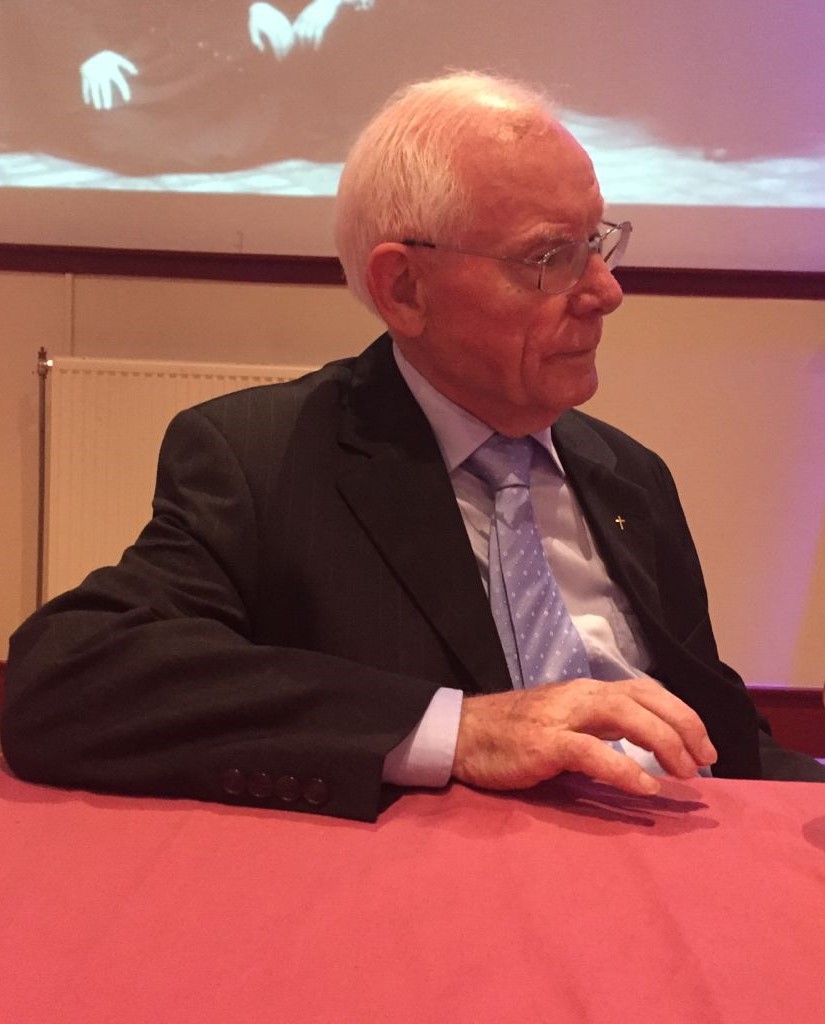
Harrie Verhoeven was conversant in various languages, thus speaking to the novices in their own native tongue: he would pass from English to German, French to Dutch or Italian. I never heard him speak Vietnamese, though there were Vietnamese novices with their culture. They spoke European languages and shared our western European culture. But Harrie knew how to respect their own Vietnamese culture and include it during their formation.
He often used to invite interesting persons from all over the world. Since he had made close contacts during his studies in Rome with the Focolarini movement, we benefited from this. Guests from this movement spoke to us in the novices’ recreation room; their talks or conferences were special for us, a younger generation. They were men and women, reli-gious of a high level or artists, theologians or business-men. I recall that we were all very impressed.
Regularly the Provincial Superiors from Germany, Belgium or Switzerland, accompanied by their Con-sultors, would come to visit their respective novices at Baarlo. As novices, we learned that we belonged to the same Congregation in Europe. The Vietnamese novices were under the jurisdiction of the Swiss Provincial. It was clear for us that our Congregation was international.
Harrie took the novices during the holidays to the Focolarini movement’s Mariapoli, which were large religious gatherings of Focolari adherents. We saw another facet of our Master, who spoke with ease to groups of hundreds of people, moving effortlessly from one language to another as he captivated the attention of people in a special way. By means of the Focolarini movement, he had a worldwide network.
In 1968 he was appointed the Superior of the house of Brakkenstein, to which with him the novitiate was transferred. There, in the university city, he seemed to us still more ‘global’ than we thought. He no longer wore a cassock and was often absent from the house. His sojourn in Nijmegan didn’t last long, for he was elected Superior General of the Congregation and departed for Rome.
Being Superior General, he didn’t often return to the Netherlands. The whole world had become his home. He related to us Dutch the events of aggiorna-mento taking place in the whole Congregation. In speaking of this on his rare visits to the country, he did so in an enthusiastic way, that was clear and con-vincing.
I recall with much gratitude and joy the Eymard session at Lyons in 1980, organized by the General Council and over which he presided. During the 14 days in the former seminary of Saint Joseph, we gathered with confreres from all Europe. These were two formidable weeks that have had an enormous influence on my life as a Blessed Sacrament religious. During the session Harrie was a fantastic inspirer and coordinator. He appeared there really loved by his confreres. With my confreres Antoon van Schaik and Bert Janssen, I wrote an account of this Eymard ses-sion and shared it at the meetings of the communities in Belgium and Germany. On returning to the Netherlands, inspired by Harrie and his Council, I began to study spirituality in the city of Lyons, where Father Eymard was able to discover his true vocation as an ‘Apostle of the Eucharist’.
Based on the session at Lyons, various initiates were taken in Belgium and the Netherlands to spread Father Eymard’s spirituality in a contemporary way. I was able to work on many editions, talks or spiritual pilgrimages. At Nijmegen, a Centre for parish spiritualty (C.P.S.) was opened to spread the eucharistic spirituality in parishes. For me it is unforget-tably that Harrie on returning to his country accompa-nied the pilgrimages and told me he regarded them useful and inspired, though it was he himself who was my teacher in the SSS family.
Father Wim van Meijgaarden, sss
Dear readers,
I was asked to write something about Father Verhoeven of happy memory, since I was one of his first group of novices.
I made my novitiate in the chateau of Baarlo, in the north of Limburg, Netherlands, from September 1962 until and including September 1964. In 1962/63, the pious Father Chris Köhler was our master of novices. He followed the “classic pattern” of conventual life before Vatican II, using the Constitutions in Latin, a part of which we had to learn by heart. He, being a philosopher, then initiated us into logic. This was the time of Pope John XXIII’s aggiornamento, the renewal of the Second Vatican Council, of revolution: many of the plaster statues, including those of Father Eymard, were consigned to the attic of Baarlo, some of them thrown onto the ground by us in pieces… insipid piety was over. In the attic there were also old books about the Congregation or its Founder. I salvaged 200 of them, which I later brought to our library of the St Peter-Julian Eymard formation house in Maputo.
Then the young Father Harrie Verhoeven arrived. If I’m not mistaken, he met the group of those who were then novices: Hein Vrijdag, Wim Storm, Hub Kuijpers, Sjaak Lempers, Ruud Olthof, Alfred Tent (from Germany), Bruno (from Switzerland) and later some Vietnamese and other Belgians. This internationality shows the international attitude of our new master. On the basis of the Constitutions and other texts of our Founder, he invited us to meditate and study also biblical texts. For us this was a new dimension of depth and life. What was likewise new: our living spaces were cheered up with carpets and curtains. Everything became more alive and colourful, with new furniture, where we could gather enjoyably as a community.
We had visits from influential people in spirituality and the social domain, close or distant friends of our new master, also from members of the Focolarini movement. And finally, we took part, wearing cas-socks, in the first Mariapoli, in Tilburg then in Belgium. We went also on holiday to the Swiss mountains, or to Rigi, in the Tyrol, which enabled us to get to know other communities of our Congregation. This brought about a lived experience of belonging to the great S.S.S. family. An event that made an impression was a visit to a coal mine in Limbourg, going deep underground wearing a helmet and headlamp. Father Verhoeven considered it important for us to learn about the world and how to integrate our religious life to it.
To sum up all this: we were learning about religious life in a more human way, open to the world. Harrie had a broad mind, an open heart; he was for us a friend. We could call him ‘Harrie’! A tension about being accepted for vows vanished. Religious life sprang up from the depth of our hearth.
Thanks.
Father Hub Kuijpers, sss
Prayers …
Dear Father General and SSS Religious.
This is to convey my condolences on the departure of Fr. Harrie Verhoeven, SSS who having imbibed the spirit of the Eucharistic charism and mission led the Congregation following closely the footsteps of St Peter Julian Eymard its Founder.
I believe that he will be given in God's merciful love a place at the heavenly banquet. I have had the joy of meeting him and shall offer the Holy Mass for the repose of his soul tomorrow. May he rest in peace.
+ J. Winston S. Fernando, s.s.s.
Bishop of Badulla
Sri Lanka
Dear Father Joseph,
I have received your email, in which you ask me to translate Father Harrie Verhoeven’s text, which presents a moving and personal testimony that seems to recount his journey like ‘Jacob en route’, reminiscent of Father Peter-Julian Eymard’s.
Gladly, Father, I will undertake to translate this va-luable document of a former Superior General, whom I had the privilege of knowing personally since he entrusted me with the task of various responsibilities in the service of the Congregation – “haec minima sanctae matris Ecclesiae familia” (Const. 1). It was Father Harrie who asked me to be Master of novices in England (1976-1981), a member of a consultative commission regarding the level of prayer, and also to be part of the commission for the revision of the Rule of Life in preparation for the General Chapter of 1981.
Yes, I have so many memories of this great person, so many affectionate recollections of this man as a dear brother. Most certainly I will celebrate the Eucharist for the repose of his soul, praying that he may now enjoy the blessedness of contemplating face to face the Lord, whom he used to adore under the sacramental veil.
Fraternally,
Father Michael G. Parker
